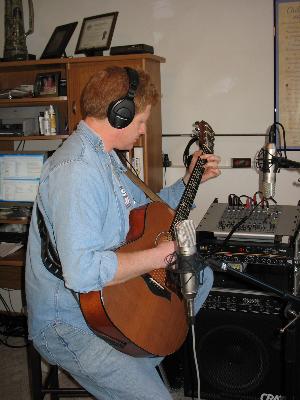©Will Spicher 2007
![]()
Years before I bought the 414, I was playing the twelve string as a member of a worship team. We had lost our keyboard and piano players leaving bass, drums, and me. That meant I somehow had to produce most of the harmonic structure of the music, and that meant I needed to improve and expand my abilities. As I began to do so, I felt a discomfiting sense of self-doubt--as if I couldn't give myself permission to grow as a musician. One day I was praying about this and asked, "Is this really you calling me to practice and grow? Or am I just pursuing selfish ambition or vain conceit?" In rare fashion, the answer came quickly to my conscience: "I AM the One who said, 'play skillfully.'" Since that day (1999, I think), I have never second-guessed my calling as a skilled, Christ-following, worship musician. The title, Nothing But The Call, reflects this context (and it prefigures an upcoming song to which this song serves as a prelude).
This is the most challenging fingerstyle piece I have written. When I first got the 414, I was so used to the twelve-string that I could hardly play (based on feedback from my family). One day I went to Phil Keaggy's web site and discovered that his best stuff was available in tablature--songs I had been listening to for years and dreaming of playing them! I bought one of the books and struggled for weeks with the first measure of the first page. But, after nearly three years of torturing--er--stretching myself with this stuff, my fingerstyle technique has come a long way. Thanks for raising the bar, Phil!
I decided that, with this song, I wanted to capture what I hear when I am playing while sitting on my couch. I would not resort to
effects--not even delay--and I wanted a full, spacious stereo effect.
Years ago, when training at Full Moon Recording Studio, I learned about the
Mid/Side recording technique and
have wanted to try it ever since. It involves two condenser microphones
(one with a figure -eight pattern, split to two channels, one channel
polarity-reversed).
hear when I am playing while sitting on my couch. I would not resort to
effects--not even delay--and I wanted a full, spacious stereo effect.
Years ago, when training at Full Moon Recording Studio, I learned about the
Mid/Side recording technique and
have wanted to try it ever since. It involves two condenser microphones
(one with a figure -eight pattern, split to two channels, one channel
polarity-reversed).
But, when I "googled" the topic of recording an acoustic guitar, the vast majority of articles focused on the "Separated-Pair" technique (shown). Taking full advantage of the power of today's technology revolution, I recorded both methods, put them out on the web, and asked the people at the PowerTracks User Forum for feedback. The interface allowed me to create a poll which ended up somewhat split (11 for the separated pair, and 9 for the mid/side pair). But, as I weighed the responses against my own subjective impressions, I got a better idea of what I was really after (Read the thread).
I ended up liking the separated pair (version A) because of its stereo image, but I liked the mid/side pair because it had better bass response and was more compatible with monaural listening. Have a listen to the various possibilities:
So, in the end, I decided to go with the separated pair and pull a trick to improve the bass: add the 414's pickup (Expression System) as a third track to which I EQ'd out the highs and compressed to give a more even bass response. But the mics carry the rest of the mix.
Sing joyfully to the LORD, you righteous;
it is fitting for the upright to praise him.
Praise the LORD with the harp;
make music to him on the ten-stringed lyre.
Sing to him a new song;
play skillfully, and shout for joy.
For the word of the LORD is right and true;
he is faithful in all he does.
The LORD loves righteousness and justice;
the earth is full of his unfailing love.
Psalm 33:1-5
Back To
WillSongs++
updated 10-Feb-2007